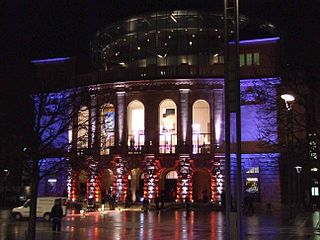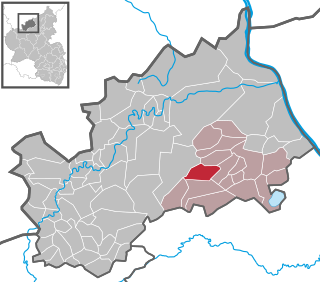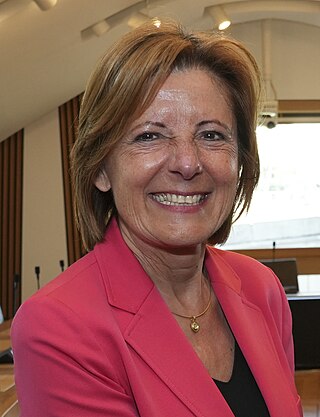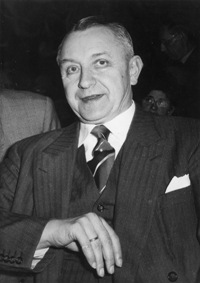
Rhineland-Palatinate is a western state of Germany. It covers 19,846 km2 (7,663 sq mi) and has about 4.05 million residents. It is the ninth largest and sixth most populous of the sixteen states. Mainz is the capital and largest city. Other cities are Ludwigshafen am Rhein, Koblenz, Trier, Kaiserslautern, Worms, and Neuwied. It is bordered by North Rhine-Westphalia, Saarland, Baden-Württemberg and Hesse and by France, Luxembourg and Belgium.

The Carl Zuckmayer Medal is a literary prize given by the state of Rhineland-Palatinate in memory of Carl Zuckmayer. The medal itself was fashioned by state artist Otto Kallenbach. The prize is also given with a 30 liter cask of Nackenheimer wine from the Weingut Gunderloch, a winery valued by Zuckmayer. The bestowal takes place on 18 January, the anniversary of Zuckmayer's death.

Spessart is a municipality in the district of Ahrweiler, in Rhineland-Palatinate, Germany.

The coat of arms of Rhineland-Palatinate was, along with the flag of Rhineland-Palatinate, designed in 1947 after the new Land of Rheinland-Pfalz was formed by the authority of the French High Commissioner to Germany. The flag symbolizes the dedication of Rhineland-Palatinate to Germany as well as the democratic traditions of Germany. These colours were seen first in this combination during the Hambacher Fest, a mass demonstration by German liberals at the ruins of the Hambacher Schloss in 1832. The Palatinate is therefore connected to these colours.

Nittel, on the Upper Moselle, is an Ortsgemeinde in the Landkreis [county] of Trier-Saarburg in the state of Rhineland-Palatinate. It belongs to the Verbandsgemeinde [United Municipalities] of Konz. The place, located between dolomite and limestone cliffs, is a nationally recognized resort.

The International Rheinland-Pfalz Rundfahrt was a multi-stage road bicycle race held in Rhineland-Palatinate, Germany. In the years from 1966 to 2007, it was considered one of the biggest sporting events in Rhineland-Palatinate. No other city was as often the stage destination of the Rheinland-Pfalz Rundfahrt as Bad Marienberg.

The Deutsche Staatsphilharmonie Rheinland-Pfalz is a German orchestra based in the German state of Rhineland-Palatinate, in Ludwigshafen am Rhein.

Marie-Luise "Malu" Dreyer is a German politician of the Social Democratic Party (SPD) who has served as the 8th minister-president of Rhineland-Palatinate from 2013 to 2024. She is the first woman to hold this office. She served a one-year-term as president of the Federal Council from 1 November 2016 – 31 October 2017, which made her deputy to the president of Germany while in office. She was the second female president of the Federal Council and the sixth woman holding one of the five highest federal offices in Germany. On 19 June 2024 she announced her resignation from the office of minister-president with effect from 10 July.

The Verdienstmedaille des Landes Rheinland-Pfalz is a civil order of merit, of the German State of Rhineland-Palatinate, whose Foundation on February 13, 1996 was carried out by Minister-President of Rhineland-Palatinate Kurt Beck. The award of the Medal of Merit is given as a sign of recognition and appreciation of special voluntary contributions to society and their fellow human beings, especially in the areas of corporate, social, cultural, sporty life as well as in environmental and nature conservation.

Wilhelm Boden was a German lawyer, civil servant and politician. From 1946 to 1947 he was the first Minister President of Rhineland-Palatinate.

Eveline Lemke is former German politician and member of the Alliance 90/The Greens. From 18 May 2011 until 18 May 2016, she was vice minister president of Rhineland-Palatinate and Minister for Economics, Climate Protection, Energy and Regional Planning. On 27 March 2011, she was elected into the Landtag of Rhineland-Palatinate. She was the leading candidate for her party in the 2016 Rhineland-Palatinate state elections along with The Greens faction leader in the Landtag, Daniel Köbler, after having been leader of the party since 2006. As vice minister Lemke represented the state of Rhineland-Palatinate in the German Bundesrat. As author and speaker in green technological issues and Circular Economy, she founded Thinking Circular in 2017. This thinktank is listed in the Sustainable Development Goals Help Desk, a platform by the United Nations since July 2018. She is also working as consultant together with Prof. Michael Braungart, chemist and inventor of the design philosophy Cradle-to-Cradle, Martin Lees and David Wortmann (DWR-Eco-Innovation-Alliance).

The Odenbach is a 22.7-kilometre-long (14.1 mi) orographically right bank tributary of the Glan in the counties of Kaiserslautern and Kusel in the German state of Rhineland-Palatinate.
The orders, decorations, and medals of the German states, in which each states of Germany has devised a system of orders and awards to honour residents for actions or deeds that benefit their local community or state, are in turn subsumed within the German honours system. Each state sets their own rules and criteria on eligibility and also how each medal is awarded and presented. Most of the orders allow for the recipient to wear their orders in public.
Rüdiger Sterzenbach is a German economist and transportation scientist, sports official, CDU politician and a representative of a family of entrepreneurs. He was professor for economics and passenger transport management at Heilbronn University of Applied Sciences, former president of the regional sports federation of Rhineland-Palatinate "Landessportbund Rheinland-Pfalz", chairman of the regional sports foundation of Rhineland-Palatinate "Sporthilfe Rheinland-Pfalz/Saarland" and economic policy spokesman for the CDU Rhineland-Palatinate. His father was a factory worker, his mother was a housewife. He is married and has two grown sons.

Angelika Glöckner is a German politician (SPD) and a member of the German Bundestag since 2014.

Manfred Werz is a German civil engineer and the former president of the Federal Association of Road and Traffic Engineers from 1990 to 1993 and Road Administration Rheinland-Pfalz from 1995 to 1998 in Germany. In 1998, he earned the Wirtschaftsmedaille des Landes Rheinland-Pfalz, a prestigious award and acknowledgement for his work, handed by Rainer Brüderle, Minister of Economics and Transport of Rhineland-Palatinate at the time.
Magnus Backes was a German art historian and historic preservationist. From 1983 to 1991, he succeeded Werner Bornheim gen. Schilling and Hartmut Hofrichter as the third Landeskonservator of the General Directorate for Cultural Heritage Rhineland-Palatinate Rheinland-Pfalz in Mainz.
Hans-Wolfgang Spiess, also Hans Wolfgang Spiess, is a German polymer chemist who specializes in the Nuclear magnetic resonance spectroscopy of macromolecules. He was director of the Max Planck Institute for Polymer Research in Mainz until his retirement in 2012.

Emil Jürgen Zöllner is a German medical professional and politician (SPD). From 1991 to 2006, he served as Minister of Education and Science in Rhineland-Palatinate, and additionally as Deputy Minister-President from May to November 2006. During the 2006 to 2011 legislative period, he headed the Senate Department for Education, Youth, and Science of the Berlin Senate.















